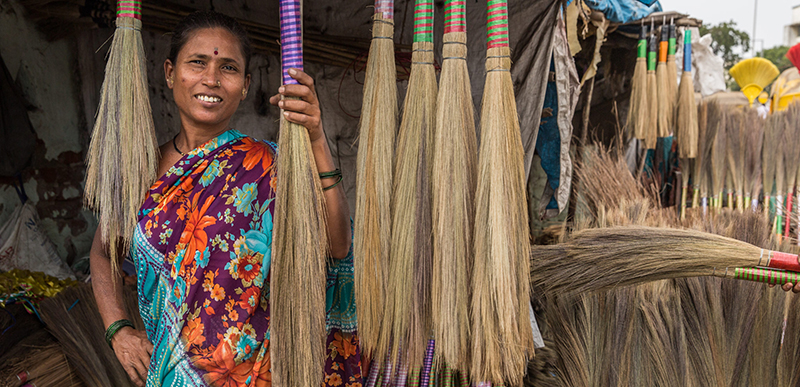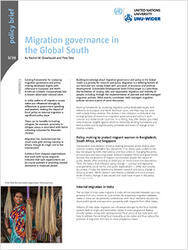Policy Brief
Migration governance in the Global South
Building knowledge about migration governance and policy in the Global South is a priority for research and policy. Migration is a defining feature of our time and one closely linked with processes of economic and political development. Sustainable Development Goals (SDGs) target 10.7 prioritizes the facilitation of ‘orderly, safe, and responsible migration and mobility of people, including through the implementation of planned and well-managed migration policies’. What exactly constitutes ‘well-managed’ migration policies remains a point of some discussion.
Existing frameworks for analysing migration governance and policy-making developed largely with reference to European and North American contexts. Comparatively less is known about post-colonial cases
In India, patterns of migration across states are influenced strongly by differences in government spending and taxation, making the impact of fiscal policy on internal migration a significant policy issue
There can be benefits to hosting refugees, for example, proximity to refugee camps is associated with better schooling outcomes for Rwandan children
Migration has revolutionized the small-scale gold mining industry in Ghana, though at a high cost to the environment
Evidence from diaspora organizations that work with Syrian migrants indicates that such organizations can be crucial partners in providing needed assistance to displaced people
Existing frameworks for analysing migration policy developed largely with reference to European and North American cases, and they may not carry well outside these contexts. The studies in this collection contribute to the emerging body of research on migration governance and policy in post-colonial and Global South countries. In so doing, they offer deeply-grounded new empirical insights against which to reconsider existing frameworks and best practices and to explore policy processes and levers of change across diverse contexts.
Policy-making to protect migrant women in Bangladesh, South Africa, and Singapore,
Comparative consideration of policy-making processes across diverse post-colonial contexts highlights four key points. First, these cases underline the key role played by both international and local actors in changing the policy environment and balancing power relations between NGOs and government. Second, the vulnerability of migrant communities shapes the nature of public debate, often inserting an emphasis on moral action into discussions. Third, the factors that influence policy change — political and legislative arrangements, social norms, and public expectations — differ dramatically by context. Finally, the relationship between research and policy change is tenuous at best. While research was heavily contested and not a primary driver of policy change, it was valued and could have impact in the policy-making process.
Internal migration in India
The number of inter-state migrants in India almost doubled between 1971–01, growing from 10.5 million to 19.8 million. As elsewhere, migration between states in India can be politically contentious, with 'local’ residents reluctant to share public goods and economic prosperity with migrants from other states.
Patterns of inter-state migration are influenced strongly by the fiscal transfer system, both in origin and destination states. A more progressive federal transfer system, along with developmental fiscal policy at the state level, can help to address the existing fiscal inequality across states and thus reduce the pressure of migration from less to more prosperous states.

Refugees and host communities
Rwanda currently hosts around 160,000 refugees and maintains a relatively permissive policy towards them, including the promotion of a 'community integrated approach’ in which 'programs meant to benefit refugees have to also benefit local communities and programs for citizens’ benefit refugees’. Rwanda therefore provides an interesting case study for looking at the relationship between refugees and host communities.
Analysis suggests that proximity to refugee camps is related to better schooling outcomes for Rwandan children and to more positive local attitudes about the impact of refugees on local education. These findings contribute to a growing body of work which demonstrates that refugees need not be a 'burden’ and that there are benefits to hosting refugees in low-income countries.
China–Ghana irregular migration
Between 2008 and 2013, roughly 50,000 Chinese — mainly from Shanglin County in Guangxi — migrated to Ghana to work in the informal small-scale gold mining sector. This migration has been controversial in Ghana, not least because small-scale mining has been legally restricted to Ghanaian citizens only and because the environmental costs have been high.
This mass migration has revolutionized the small-scale gold mining industry, with Ghanaian miners now using machinery and techniques introduced by Chinese miners with positive implications for the earnings of both Ghanaian and Chinese miners. Political impacts have also been significant. Many state and traditional authorities were present in the sphere of migrant policy, often to abuse their public authority for private wealth accumulation. In addition, unregulated small-scale mining has adverse environmental consequences, the scale of which has grown due to intensified gold production.
In short, the migration of Chinese miners to Ghana has had diverse and sometimes dramatic impacts on livelihoods and the developmental landscape upon which politics, policy, and governance play an important role.
Diaspora organizations for Syrian migrants
Further consideration of migration governance is important in addressing SDG target 10.7, focused on the design and implementation of well-managed migration policies.
The factors that influence policy change— such as political and legislative arrangements, social norms, and public expectations — are highly context-dependent, implying that efforts aimed at policy change must also be context-specific
NGOs may deploy informal social accountability mechanisms that give them an operational advantage in high-risk environments, such as conflict zones, making them valuable partners in the provision of social assistance
Diaspora organizations can play a significant role in assisting migrants. The demand for such assistance is especially pronounced in fragile situations with poor governance. It is therefore important to consider governance within these organizations, particularly in the areas of accountability, organization, and degree of inclusion in the social environment. In a study of four non-profit Syrian diaspora organizations, all four employed informal social accountability mechanisms to address uncertainty and other challenges in their daily operations. In this sense, diaspora organizations may have an advantage over other actors in conflict zones because of their better ability to deploy social networks, to identify dependable partners, be informed about challenges in their operational environment, and enforce agreements through social pressure and personal relationships. These characteristics make such organizations useful partners for larger international organizations in global efforts to assist migrants.
 Join the network
Join the network